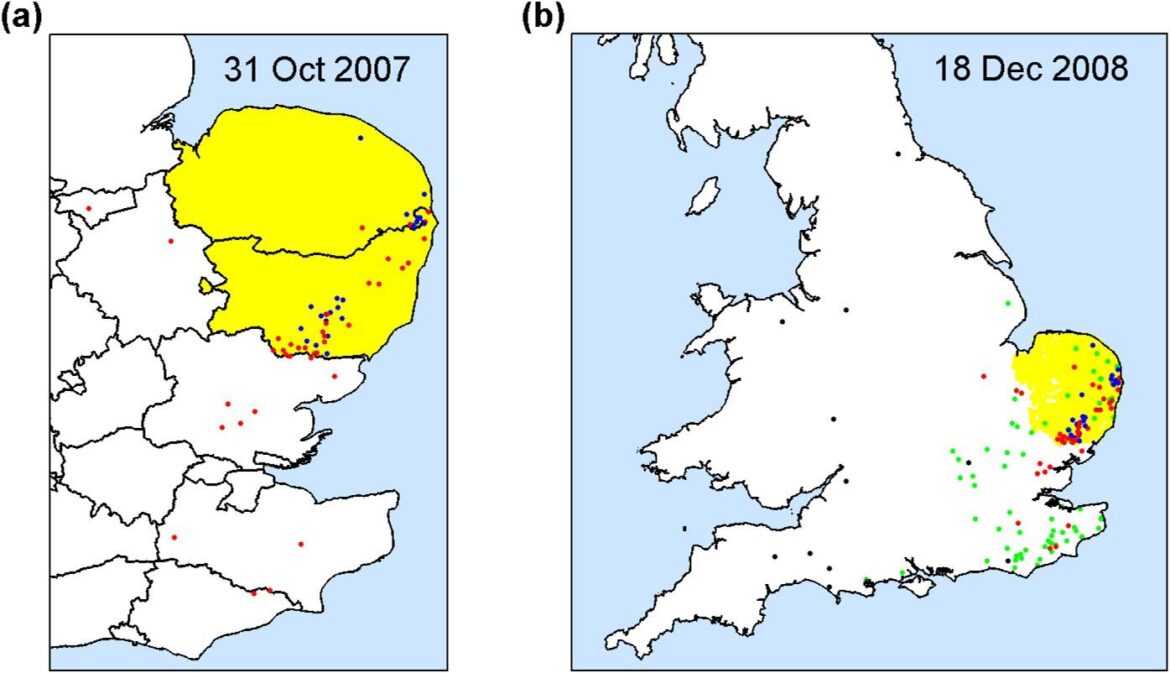As the gentle breeze of a summer evening sweeps across the UK, a silent threat looms overhead. The unsuspecting countryside is being invaded by tiny, voracious midges carrying the dreaded bluetongue virus. With reports of infected livestock already surfacing, farmers and officials are on high alert as they brace themselves for a potential epidemic. The delicate balance of nature is once again put to the test as these minuscule insects play a dangerous game of roulette with the health of the nation’s livestock. Let us delve deeper into this ominous warning of the bluetongue virus spreading its wings over the British Isles.
Bluetongue virus spreading through UK due to midge infestation
The Bluetongue virus has been causing concern in the UK as cases have been on the rise due to a surge in midge infestations. These small insects are known carriers of the virus and their increased presence has raised alarms among livestock owners.
Authorities are urging farmers to take precautions to protect their herds from the virus, which can have devastating effects on livestock. Some of the symptoms of Bluetongue virus in animals include fever, swollen and blue tongues, and in severe cases, death. It is crucial for farmers to be vigilant and implement measures such as insect repellents and vaccinations to prevent the spread of the virus among their animals.

Devastating effects of Bluetongue virus on livestock industry
Recent reports have highlighted the alarming spread of the Bluetongue virus in the UK, as midges carrying the virus have been blown in from mainland Europe. This has raised concerns among farmers and veterinarians about the devastating effects this virus can have on the livestock industry.
The Bluetongue virus can infect a wide range of domestic and wild ruminants, including sheep, cattle, and goats. The virus is transmitted through the bites of infected midges, causing symptoms such as fever, nasal discharge, and swelling of the face and tongue. In severe cases, it can lead to death in affected animals, resulting in significant economic losses for farmers. **Preventive measures such as vaccination and insect control are crucial to protect livestock from this potentially deadly virus**.

Preventative measures to protect livestock from Bluetongue virus
It’s essential for livestock owners to take proactive measures to protect their animals from the threat of Bluetongue virus, especially now as midges carrying the virus have been blown into the UK. Here are some preventative measures that can help safeguard your livestock:
- Vaccination: Ensure that all animals are up to date with their vaccinations to build immunity against the virus.
- Control midge populations: Use insecticides and repellents to deter midges from coming into contact with your livestock.
- Quarantine and monitoring: Keep new animals separate from the rest of the herd to prevent the spread of the virus and monitor for any signs of infection.
By taking these precautions and staying vigilant, livestock owners can help prevent the spread of Bluetongue virus and protect their animals from harm. It’s crucial to act swiftly and decisively to ensure the health and well-being of your livestock in the face of this potentially deadly threat.

Government response to Bluetongue virus threat
The recent influx of midges containing the Bluetongue virus into the UK has prompted the government to issue a warning to farmers and livestock owners. The virus, which is spread by biting midges, can cause severe illness in sheep and cattle, leading to economic losses and animal welfare concerns.
In response to this threat, the government has outlined a series of measures to help mitigate the risk of the virus spreading further. These measures include:
- Increasing surveillance and monitoring of livestock populations
- Issuing guidance on how to prevent midge bites on animals
- Educating farmers on the symptoms of Bluetongue virus and what to do if they suspect their animals are infected
Final Thoughts
As we brace ourselves for the potential spread of the bluetongue virus due to midges being blown into the UK, it is important to stay informed and take necessary precautions to protect our livestock. By being vigilant and proactive, we can work together to minimize the impact of this virus and safeguard the well-being of our animals. Remember, knowledge is power when it comes to facing challenges like this. Stay safe and stay informed.



